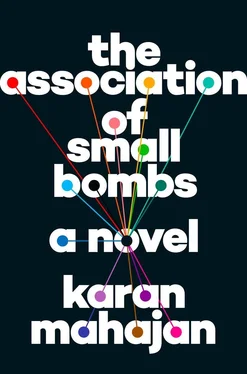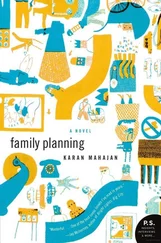He got the chance with physiotherapy. In a clinic in Safdarjung Enclave, he lay in a cube of curtains, tortured by tinny Hindustani classical music as a slight woman in a lab coat lathered his wrists with cold goo and ran the feeler of an ultrasonic machine over them. Adults with decomposing bodies moaned around him in adjacent cubes. In this house of pain, he too was a grown-up. His physiotherapist was a South Indian lady named Jaya — his first experience with South Indians apart from Deepa Khurana. “You’re Muslim?” she asked, clearly startled. “You don’t look Muslim.” But she relaxed when he mentioned the blast. “It’s very bad. These days one can’t live in this country.” She was one of those people who are lost within themselves. She told him the same story over and over about how her brother worked in information technology in Houston and how she had visited him there. “There is a very high standard of living there,” she said. She asked the same questions every time, as if discovering anew that there was a patient there. “You also want to study IT, no? There’s a big scope in it.” He lay impatiently in bed. Afterwards, he went with his mother for a walk through Deer Park, happy among the vaguely caged animals — deer, peacocks, rabbits, the moving rubbish of stray dogs and cats, the mynahs with their minimal beauty.
________
When the terrorists were arrested, Mansoor asked, “But Papa, what if they get out of jail?”
“There’s a strict sentence for terrorism,” Sharif reassured him. Though he himself was wondering whether the right men had been captured; there was already talk among the Muslim intellectuals he knew, professors at Jamia, that the police had rounded up innocents as “terrorists”; that they had planted a stepney, a spare tire, in the room of a couple of papier-mâché artisans in Bhogal and arrested their fourteen-year-old cousin, who had come for his summer vacation to Delhi from Srinagar; that the other arrested men had been in custody even before the blast.
“Look, the thing is, they didn’t do any of the arrests with an independent witness present,” Rizwan Ali, a professor at Jamia, told him. “Without that, the case falls apart. There’s zero credibility. Now, Sharif-sahb, we also want that the people be brought to book — that’s the goal. But I have a fear, having seen these cases before, that you’ll find the same problem here.”
“Bhaijaan, it’s none of our business. We’re just happy that our son survived.”
But when Sharif went home from this gathering in the Zakir Bagh apartments and saw his son, he became fearful. He sat behind Mansoor on the floor as he played his Mega Drive (his wrist had healed just enough that he could click a controller) and parted his son’s hair in the peculiar way his own mother had once parted his hair, closing his fingers together into a spoon and running them from the part to the ear over and over again.
“Can you scratch a little also, Papa?” Mansoor asked, not turning around.
“Of course!”
That night, Sharif told his wife, “Watch your spending — we should send him to America for college when he grows up.”
Years passed. In 2001, at the age of seventeen, Mansoor left Delhi for the US, excited to pursue a degree in computer science, which had become his main passion after years of confinement in his home. He was more intimate with his 486—and then his Pentium with Intel Inside — than with any person in Delhi. After all, to see other people meant you had to leave your house, and this made them accessories to danger.
He had also become a decent programmer and web designer, building a tennis website, Sampras Mania, with a friend, which, though it plagiarized its stats and player summaries from ATP and ESPN, presented them in a (he thought) more orderly fashion.
He won second-place trophies in class eleven in the computer quizzes at ACCESS and MODEM, where he was, he noted, the only Muslim in attendance, the Azim Premji of the gathering, if you will.
The fact of the bombing, the exceptionalism of his last name in Hindu Punjabi society — these things filled him with an odd pride.
He became aware of the oppression of Muslims as the BJP tenaciously clung to power all through the late nineties. His mother never stopped being alarmed. “They’re still angry about something that happened fifty years ago,” she’d say, thinking of partition, and returning again and again to the images of party workers swarming the domes of the Babri Masjid, gashing the onionskin of cement with hammers. Mansoor concurred. He believed, like his father, that the imprisoned men might be innocent. “Is there anything we can do as informed citizens?” he asked, parroting the vocabulary of his earnest civics textbooks.
“In this country they prefer deformed citizens to informed citizens,” his father said drily. “And how will the Khuranas feel?”
“They also want justice.”
“Who knows what they want?”
The families, in the years since Anusha’s birth, had grown apart. The Khuranas had stopped calling the Ahmeds for social gatherings — which they still organized — and often didn’t return Afsheen’s monthly, inquiring, concerned calls.
“Ulta chor kotwal ko daante,” Sharif said, bungling the context of the homily. This is case of the thief scolding the watchman . “They should be thankful to us and to Mansoor. If he hadn’t been there, they wouldn’t have known what happened.”
Since the first few visits to the market, the Khuranas had recovered scraps of cloth they were sure came from the boys’ shirts. They’d found the exact spot where the boys had died from Mansoor’s memories.
“You can’t get inside people’s minds,” Afsheen said. “But their situation also isn’t good.”
She had her own theory: their marriage was in trouble. She had heard it from a common friend. But she did not think it right to gossip about this with her husband.
________
When Mansoor was set to leave for the U.S., though, the Khuranas came over with Anusha and everyone was together again. An anxious serenity pervaded the air.
“Have a wonderful time abroad,” Deepa Auntie said, rubbing her nose, as she did when she wanted to convey emotion, and presenting Mansoor with a fragrant envelope of rupees, rupees, which, of course, would be useless the minute he stepped on the plane.
“Thank you, auntie.”
“You must visit the museum where they keep Eadweard Muybridge’s first film.” Vikas Uncle was full of advice about the U.S., though it wasn’t clear he’d ever been there.
Anusha ran over and gave Mansoor a hug at the waist and then went back to deftly polluting a notebook on the ground with the unnatural jumping colors of sketch pens.
She was four now, the daughter of the bomb.
________
Mansoor arrived in August on a farmlike campus in Santa Clara that was wide open and safe and he settled into his dorm, getting to know Eddy and Chris, his roommates, one a Hispanic football player from San Antonio, the other an Armenian-American tennis player from Los Angeles, each creature alien to the other in build and form (Eddy massive, Chris tall, Mansoor slight but hairy), the alienness canceling into a common brotherly bonding.
“Dude!” “Dude!” “Dude!” they said, addressing each other, and Mansoor had never been happier. He developed a routine of working hard on his C++ assignments by day and then loitering in the cool California air by night as freshmen stormed the campus, singing their dorm chants.
He was like a person who, thinking his vision perfect, puts on glasses for the first time to discover he has been going blind.
Читать дальше












